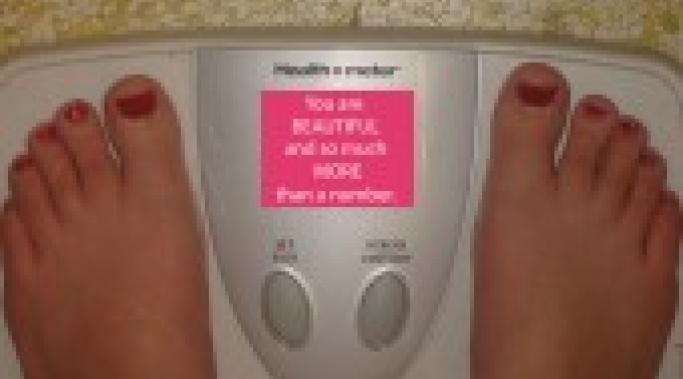For months, I have felt consumed by anxiety and depression. I would sit down to write something, only to feel that the blank screen was taunting me. I would attempt to read something for graduate school, but could only manage to read a few sentences until my mind wandered off into nothingness. At its worse, I would pace the house and twist my fingers into knots, trying to will away the anxiety and do something, anything, useful.
Today it hit me — anorexia nervosa has stolen key parts of my life and now I must fight to reclaim myself.
Eating Disorders Recovery
National Eating Disorders Awareness Week 2011 ends Saturday, Feb. 26. Each year as it draws to a close, I always think about what I and others have gained from the presentations, articles, and other activities devoted to helping people understand eating disorders.
The prevailing message each year is one of hope and belief that eating disorders do not have to rule anyone's life.
Developing anorexia nervosa in my early forties still feels a bit surreal. As I begin to recover and regain health, I am looking for answers that might not ever be found. Why would a woman with no previous history of any eating disorder suddenly fall into the hole of anorexia starting at the age of 41?
Like Alice in Wonderland, I have been moving through the strange world of anorexia perplexed by my very presence here. The questions continue to hammer at my brain.
I reached my healthy goal weight weeks ago. I continue to eat well and maintain my weight. I am feeling more alive than I have in years, and I would like to forget I ever had anorexia nervosa and move on to real life.
It isn't that easy. Now I need to discover why I developed an eating disorder at the age of 42 and resisted recovery for years until I almost lost everything, including my life.
Living with anorexia, I've been struggling to get to a healthy weight for several years. As I learned from my doctor, reaching your goal weight is a key part of eating disorder recovery. Watch this video to understand why.
The road to eating disorder recovery has been a long and difficult journey for me. I often have felt lost in the fog of anorexia, unable to relate to my husband or other people. I have struggled, at times, to even think when I was in my worst restrictive periods. Often, I would wake up and wish I had died in my sleep. I was that tired of fighting anorexia.
Today, I feel triumphant. I reached my healthy weight this week, and my doctor says I am ready to move onto the next step of recovery: peeling off the layers of anorexia and discovering my true self.
There are times I am strong and focused on recovery from anorexia nervosa. There are other times I feel hopeless. It is at those times I see my life as a dark and endless tunnel. I can only see anorexia in my future, and it looks like a bleak future without hope nor life.
I felt that way last week and I could not bring myself to write one word no matter how hard I tried. I was sick at heart, and my strength was totally depleted. However, after much prayer and talk with some wonderful friends, I found myself reclaiming my strength and new hope is growing within me.
I went on sick leave in February 2009 to restart the process of eating disorder recovery. I spent almost three months at home, eating more than triple the number of calories I was used to in order to gain weight recover from anorexia nervosa. I hated every minute of it, but in the end I reached my healthy weight and experienced a taste of recovery for about six months until I relapsed.
I have again - for the fourth time, I think — started the eating disorder recovery process for anorexia of eating and gaining weight. I have been at it less than two weeks, and I still hate it. Sometimes it feels it would be easier to give up and dive right back into the eating disorder. But I believe the only way to recover from an eating disorder is going through the process.
On New Year's Eve 2009, I was with my husband, David, at a party. I ate without too much fear and had earlier wrote that I was on my way to complete recovery from anorexia nervosa in 2010.
It wasn't meant to be. However, I always try to live my life with hope. I vow that 2011 will be the year I recover. I also believe each one of you can make this the year you recover from your eating disorder.
Angela E. Gambrel Lackey, author of Surviving ED blog, talks about her struggles with Anorexia Nervosa during 2010 and offers advice about how recovery from eating disorders comes from learning to love oneself and wanting recovery for you.







